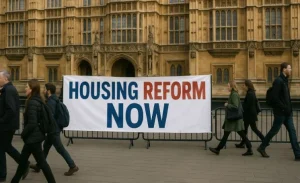When Will the Renters Reform Bill Become Law? | Full Breakdown

For millions of people renting homes across England, the past few years have been filled with uncertainty. Whether it was the fear of being evicted with just a couple of months’ notice or the pressure of rising rents without the ability to negotiate, tenants have lived with an uneven power dynamic.
Renting, for many, has not been a stable, secure arrangement, it has felt temporary, fragile and in some cases, exploitative. Let’s unpack the full picture, what the law includes, when it’s happening, and what it means for renters and landlords alike.
What is the Renters Reform Bill?

The Renters Reform Bill, now enshrined in law as the Renters’ Rights Act, is a landmark reform of the rental housing market in England. It was introduced with the aim of correcting a long-standing imbalance between landlords and tenants and is seen as part of the Labour government’s broader Plan for Change to improve fairness and dignity in essential services.
At the centre of this reform is the abolition of Section 21 ‘no fault’ evictions, which previously allowed landlords to evict tenants without needing to provide a reason. This practice had led to thousands of renters facing homelessness and discouraged many from reporting unsafe or unsanitary living conditions.
This new law transforms how tenancies operate. It removes the traditional fixed-term agreements and replaces them with periodic tenancies from the beginning. This means tenants will have more control over when and how they leave a property, and landlords will need to follow specific legal grounds to ask them to leave.
Additionally, the law introduces protections against bidding wars, provides a framework to limit unreasonable rent increases, creates a Private Rented Sector Ombudsman to resolve disputes, and bans discrimination against tenants who are receiving benefits or have children.
It also brings Awaab’s Law and the Decent Homes Standard into the private sector, enforcing minimum living standards for rental homes.
Why Was Section 21 Abolished Under the New Law?
Section 21 of the Housing Act 1988 allowed landlords to evict tenants without giving any reason. This process, often referred to as a ‘no fault’ eviction, could happen with as little as two months’ notice. For many renters, this meant living in constant fear of being asked to leave, even if they had done nothing wrong.
The abuse of Section 21 became widespread, with landlords using it to remove tenants who asked for repairs or complained about rent hikes.
In 2025 alone, over 11,000 households were evicted using Section 21 procedures. For tenant advocacy groups like Shelter, Generation Rent, and Citizens Advice, this legal tool had long been seen as a root cause of housing instability.
With its removal, tenants now have stronger legal protection. Landlords must now provide valid reasons to evict, such as serious rent arrears, antisocial behaviour, or a genuine intention to sell or move into the property themselves. Even then, they are required to give appropriate notice and seek a court order.
The government hopes that abolishing Section 21 will reduce homelessness and encourage better relationships between landlords and tenants. It’s a bold move that shifts the balance of power, giving renters the confidence to stand up for their rights without fearing sudden eviction.
How Will Tenancy Agreements Change in England?

One of the major reforms under the new Renters’ Rights Act is the move away from fixed-term tenancy agreements. Previously, most renters entered into 6 or 12-month contracts. These often locked them in, even if their living situation changed or if the property was substandard.
Now, the law replaces all new tenancy agreements with periodic contracts, which operate on a rolling basis. This structure brings much more flexibility. A tenant can leave the property at any point by giving two months’ notice, without facing financial penalties or legal issues. For renters, this means freedom to move when necessary, whether for work, family, or quality of life.
Landlords will also benefit from this flexibility, but with the important condition that they cannot remove tenants without a valid reason. Tenants now have the legal right to remain in the property indefinitely, unless they breach their tenancy conditions or the landlord has a lawful reason to repossess the home.
This change aligns England with Scotland, which moved to periodic tenancies in 2017. It is designed to end the injustice of tenants being trapped in poor-quality homes, unable to leave or ask for repairs. By encouraging accountability on both sides, the law aims to create a fairer, more adaptable renting system.
When Will the Renters Reform Bill Become Law?
In a historic moment, the Renters’ Rights Bill became law after receiving Royal Assent at 7.40pm on 27 October 2025. Now officially the Renters’ Rights Act, it marks the most significant shift in housing legislation in over 30 years.
This law directly affects England’s 11 million private renters and 2.3 million landlords, fundamentally altering the framework of private tenancies.
Although the Renters’ Rights Act received Royal Assent on 27 October 2025, it does not take effect immediately. The actual enforcement of its various provisions will roll out in phases, as announced by Housing Secretary Steve Reed.
The staggered approach is necessary because of the large scale of change. Local authorities need time to build enforcement mechanisms.
Courts must prepare for an increase in cases related to evictions and disputes. Letting agents and landlords require guidance to understand and comply with the new rules.
Expected Timeline of Implementation
| Phase | Action | Estimated Period |
|---|---|---|
| Phase 1 | Government issues detailed guidance | Late 2025 |
| Phase 2 | Abolishment of Section 21, start of periodic tenancies | Early 2026 |
| Phase 3 | Launch of Ombudsman, housing standards enforcement | Mid to Late 2026 |
The government is expected to give at least six months’ notice before the key elements of the Act become active.
Until then, landlords and tenants should begin preparing for the changes by reviewing current agreements and familiarising themselves with the upcoming legal framework.
Can Landlords Still Evict Tenants Under the New Law?

Yes, landlords still retain the right to evict tenants, but now they must follow strict legal grounds. This ensures that evictions are no longer arbitrary and that tenants have the opportunity to challenge any unjust notices.
Landlords can issue an eviction notice in cases such as:
- Significant rent arrears (now defined as three months or more)
- Documented antisocial behaviour
- The landlord or their immediate family intending to move into the property
- Plans to sell the property, though only after the first 12 months of tenancy
Tenants who receive such a notice now have the right to contest the claim in court. The process is no longer automatic, and landlords must present evidence to justify the eviction. This is a vital safeguard, particularly in cases where the eviction may be retaliatory.
Furthermore, landlords are required to give four months’ notice if they are ending a tenancy to sell or move into the property. This gives tenants more time to find alternative accommodation and reduces the trauma of sudden displacement.
By requiring court involvement and clear legal justification, the law promotes fairness and accountability in the eviction process, without completely stripping landlords of their rights.
How Often Can Landlords Raise Rent?
Under the new law, rent increases are subject to strict limitations to prevent abuse. Landlords can now raise rent only once per year, and any proposed increase must reflect the current market rate.
They are required to give two months’ written notice before the increase takes effect. If a tenant feels the amount is unfair or excessive, they have the right to challenge it at a First-tier Tribunal, a legal body set up to resolve such disputes.
Example Rent Scenarios
| Situation | Current Rent | New Proposed Rent | Legal Status |
|---|---|---|---|
| Rent raised after 12 months with 2 months' notice | £900 | £930 | Allowed |
| Rent increased after 3 months without proper notice | £930 | £980 | Not allowed |
| Rent raised by 25% without market justification | £950 | £1,200 | Challengeable in court |
These rules aim to create a fair balance. Landlords can still adapt to market conditions, but tenants are protected from unexpected or exploitative price hikes.
What Does the Law Say About Pets in Rental Homes?
For the first time in England’s rental history, tenants now have the legal right to request a pet in their rented home. Previously, landlords could refuse this outright, often without considering individual circumstances.
Under the new Act, landlords must respond to pet requests within 28 days and can only refuse with a reasonable justification. Acceptable grounds for refusal might include building restrictions, health concerns in shared housing, or unsuitable living conditions for animals.
If a landlord refuses unfairly, tenants can now challenge the decision, and the case may be escalated to the new Ombudsman.
To support landlords, the law allows them to request pet insurance as a condition for approval. This helps cover any potential damage caused by animals, giving landlords a safety net while respecting tenants’ personal needs.
This change brings England in line with growing recognition that pets are part of the family and should not be a barrier to secure housing.
Is It Still Legal to Ask Tenants for Higher Rent Offers?

Previously, it was common for landlords or letting agents to ask prospective tenants to bid above the listed rent to secure a property, especially in high-demand areas. This practice, known as rental bidding, often left tenants at a disadvantage, pricing out lower-income applicants and creating fierce, unequal competition.
Under the Renters’ Rights Act, this practice is now explicitly banned. Landlords and agents are required to list a clear, fixed asking price, and it is illegal to ask for or accept offers above that price.
This reform is intended to create transparency and fairness in the renting process. Prospective tenants can now trust that the rent they see advertised is the actual rent they’ll pay, without fear of being outbid or forced to pay above-market rates simply to access a place to live.
If a tenant feels they have been encouraged or pressured to offer more than the listed price, they can file a complaint with the new Private Rented Sector Ombudsman, who has the authority to investigate and issue binding decisions.
This change levels the playing field and helps ensure that housing access is based on affordability and suitability, not on who can pay the most.
How Will the New Law Affect Students and HMOs?
The Renters’ Rights Act includes specific provisions for students and Houses in Multiple Occupation (HMOs), recognising that student rentals operate on unique cycles and may need flexibility outside standard residential tenancies.
Purpose-Built Student Accommodation
In university-owned or large corporate-managed student halls, landlords are allowed to give two weeks’ notice to students to vacate. These providers typically operate on academic calendars and structured tenancy durations, making flexibility essential.
HMOs for Student Tenants
In cases where students rent shared housing from private landlords, the rules are slightly different. Landlords can reclaim the property under these conditions:
- The tenancy was agreed up to six months before it started
- Over 50% of the occupants are full-time students
- The landlord gives four months’ notice
This approach balances student mobility with landlord planning. However, student renters still benefit from the overall protections of the Act, including the end of no-fault evictions, fair rent practices, and safe living conditions under the Decent Homes Standard.
These adaptations help maintain stability in the student housing market while ensuring young tenants aren’t unfairly excluded from legal protections.
What Protections Exist for Renters on Benefits or with Children?

For too long, renters who receive housing benefits or have children have faced discriminatory practices in the private rental sector. Landlords and letting agents would routinely reject applicants simply because of their financial situation or family structure, often using coded language like “No DSS” in advertisements.
The new Renters’ Rights Act makes it illegal to discriminate against would-be tenants on these grounds. This includes:
- Rejecting applicants based solely on benefit status
- Refusing to let properties to families with children
- Advertising with exclusionary terms such as “no DSS” or “no children”
This protection is crucial for addressing housing inequality. Families receiving support from the government are no less deserving of secure, quality homes, and this law reinforces that.
Letting agents and landlords who violate this provision face fines, civil penalties, and potential removal from the official landlord database. Tenants can also raise complaints with the Ombudsman, who has authority to mandate compensation or issue formal reprimands.
By tackling this form of housing discrimination, the law brings England closer to a rental market that treats everyone with dignity and fairness.
Real-Time Example: The Human Side of Section 21 Evictions
To understand why these changes matter, we can look at a real-life case. Elizabeth Sugden, a 35-year-old tenant from Manchester, was served a Section 21 notice by her landlord in 2024. She had challenged an attempt to double her rent, a move she felt was unjustified. Rather than negotiating, her landlord simply evicted her.
As a result, Elizabeth found herself temporarily housed by her local council. Her belongings were put into storage, and she described her life as being “on hold”, unable to move forward, plan for the future, or find stability.
Her experience is a stark reminder of the insecurity renters have faced for decades under outdated laws. Section 21 allowed landlords to sidestep responsibility, and tenants like Elizabeth bore the consequences.
With the abolition of no-fault evictions, situations like Elizabeth’s should no longer happen. Tenants will now have the right to challenge unfair treatment without fear of sudden displacement. It’s these individual stories that illustrate the human cost of poor housing policy, and why this reform is such a vital step forward.
How to Calculate Rent Increases and Notice Periods?
Understanding how rent changes and notice periods work under the new law is key for both tenants and landlords. The Renters’ Rights Act outlines clear procedures and timeframes, ensuring everyone knows their responsibilities.
Example Calculation Scenarios
| Rule | Landlord Obligation | Tenant Rights |
|---|---|---|
| Rent increase allowed | Once every 12 months | Two months’ written notice required |
| Tenant notice to vacate | Two months at any time | No fixed-term penalties |
| Landlord repossession to sell | Four months’ notice, not within first 12 months | Legal challenge allowed if grounds are unclear |
| Eviction due to arrears | Must be at least 3 months' arrears | Tenant may defend in court |
These guidelines reduce misunderstandings and legal disputes. They give both parties a structured framework for decision-making, while safeguarding the tenant’s right to remain in their home unless proper steps are taken.
Whether you’re a renter or landlord, it’s important to understand these calculations to stay compliant and avoid unnecessary conflict.
How Will the Government Enforce These Reforms?

One of the most forward-looking aspects of the Renters’ Rights Act is its multi-layered enforcement strategy. The law doesn’t just create rules, it builds an infrastructure to make sure they’re followed.
A central part of this is the Private Rented Sector Ombudsman, which will be responsible for resolving disputes between landlords and tenants. This service is designed to be swift, impartial and legally binding, offering resolutions that might include apologies, repairs, or financial compensation.
The government will also create a Private Rented Sector Database, where landlords must register and prove compliance with housing laws. This will give tenants more transparency and help authorities monitor bad actors.
Local councils have been given new powers and responsibilities. These include:
- The ability to issue civil penalties for non-compliance
- Requirements to report on enforcement activity
- Enhanced authority to investigate poor housing conditions
Additionally, the Act applies the Decent Homes Standard to the private sector for the first time. Landlords must meet minimum safety and quality thresholds. The introduction of Awaab’s Law also places strict timeframes on repairs for hazardous conditions.
This comprehensive enforcement model ensures the law isn’t just symbolic, it has real mechanisms to deliver change.
Conclusion: A New Chapter for England’s Renters
The passage of the Renters’ Rights Act is not just a legislative milestone, it’s a defining moment in the history of housing in England.
For decades, tenants have lived in fear of unfair evictions, unchallenged rent hikes, and discrimination. This new law rewrites the rules, restoring dignity, security and fairness to one of the most important parts of people’s lives, their home.
By ending no-fault evictions, empowering renters to challenge poor conditions, and introducing meaningful protections for vulnerable groups, the government is charting a path toward a more balanced housing market.
While challenges remain, particularly around court readiness and landlord concerns, the direction is clear.
For renters like Elizabeth Sugden and the millions of others whose lives have been shaped by uncertainty, this law offers a long-overdue sense of relief, respect and reassurance. It’s a new beginning, and a better future, for England’s renters.
Frequently Asked Questions
When will the Renters Reform Bill be fully in force?
The government has not announced exact dates, but full implementation is expected by mid to late 2026 following a phased rollout.
Can landlords still evict tenants without a reason?
No. Section 21 has been abolished. Landlords now need a legal reason, such as rent arrears or plans to sell the property.
What if a landlord increases the rent unfairly?
Tenants can challenge excessive rent increases at a First-tier Tribunal, which will assess whether the increase matches local market rates.
Are bidding wars now illegal?
Yes. Landlords must publish a clear asking rent and are not allowed to accept offers above that figure.
What is the role of the Private Rented Sector Ombudsman?
The Ombudsman will resolve disputes between tenants and landlords, with the power to order compensation, repairs, or other remedies.
Are student tenancies included in these reforms?
Purpose-built student accommodation is partially exempt, but most student HMOs are included under the new rules with specific conditions.
How does Awaab’s Law apply to private rentals?
Awaab’s Law sets strict timelines for landlords to fix hazardous conditions, and it now applies to private landlords under the Act.



